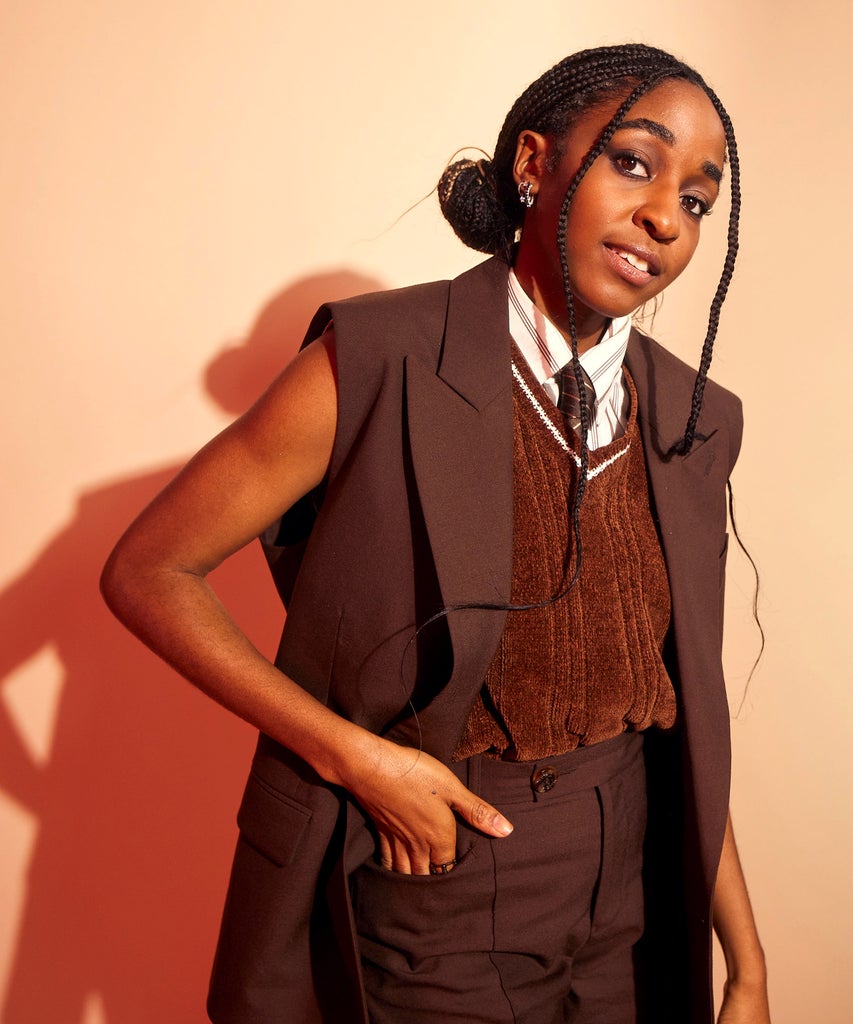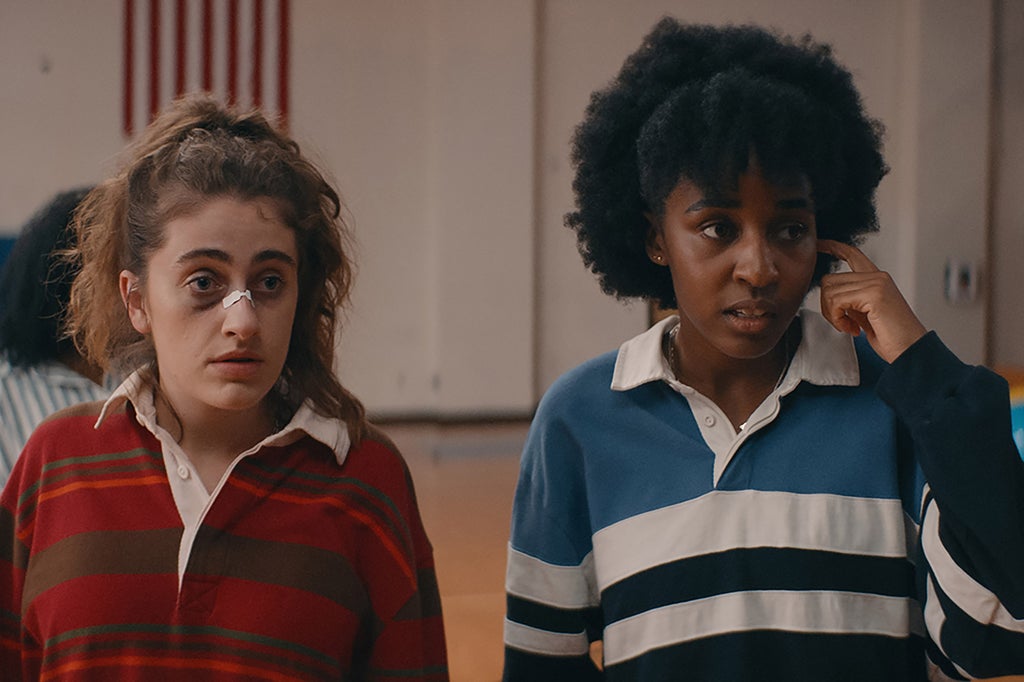
This interview took place prior to the start of the SAG-AFTRA strike.
Ayo Edebiri knows that it’s a really weird time to be working in Hollywood. When we first connect on a Zoom call, the threat of yet another strike casts a shadow over our conversation; alongside the already-striking writers, veterans and rookies alike are organising through SAG-AFTRA to push back against the Alliance of Motion Picture and Television Producers (AMPTP) for better compensation and more stability for working actors in the industry. (The SAG-AFTRA strike officially began on July 14.) Edebiri, a comedian, writer, and actor, is feeling the weight of this moment on all sides.
“We’re at a really strange inflexion point,” Edebiri (who fans might recognise from the Emmy-nominated series The Bear) says candidly over Zoom. “I feel that way as somebody in the creative industry, but also as somebody who is awake and alive and checked the news and saw that affirmative action was struck down for everybody except for legacy students. I think that it’s very easy when you hear these things to catastrophise and go to that dark place of expecting things to only get worse. But I’m trying not to do that. I want to work with people to create things that give me hope.”
Case in point, her latest work, Bottoms. Edebiri stars in the raunchy, over-the-top teen drama as one half of a duo of, putting it bluntly…lesbian incels. Josie (Edebiri) and PJ (Rachel Sennott) are high school seniors at the bottom of the social totem pole, and they’re desperate to end their sexless streak before it’s too late. So Josie and PJ do what any horny virgin would do: they create a girls-only fight club based on a lie to win over their crushes, a pair of popular cheerleaders (played by gorgeous, gorgeous girls Havana Rose Liu and Kaia Gerber) who barely know they exist. Trouble ensues when the pair’s ridiculous plan actually works, upsetting the social order of their high school by uniting girls across every social group against the violently patriarchal space they’ve been forced to exist in.
Bottoms is a decidedly chaotic film from start to end, each scene wilder and more outlandish than the last. It has all of the qualities of a good buddy comedy: slapstick humour, witty banter, and truly inappropriate one-liners that you’ll randomly remember throughout the day and burst into laughter thinking about. The film fits perfectly into an overcrowded category, but similarly to other critically acclaimed movies like Bridesmaids and Booksmart, Bottoms stands out because of the way it challenges the male-dominated genre by making women the source of the chaos. Like Seth and Evan (Superbad) before them, Josie and PJ are on a singular mission: getting laid. But if they can also become better people along the way, that’s cool too.
The magic of Josie and PJ’s story is in its ability to bring new types of people and experiences to the forefront. In Hollywood, we don’t often get to see women and girls being inappropriate in the same way men and boys often are — being thirsty onscreen has historically only been allowed to be a guy thing — but Bottoms is letting a different type of freak flag fly. (Who knew that we needed to democratise being wack and having no game?)
“(Director and writer) Emma [Seligman] and I talked so much about our own high school experiences and that feeling of spending a lot of that time on the sidelines observing,” Edebiri says of the inspiration for the larger-than-life characters of Josie and PJ. “Even though I was a main character in my own life, I didn’t necessarily consider myself one for a very long time.”
Still, bearing witness to other people’s journeys was critical in helping Edebiri fine-tune her own perspective as a comedian and a writer; having a front row seat to the mainstream allowed her to get a broader understanding of what was funny and good (and what wasn’t). In Bottoms, the comedy perfectly balances on the fine line of “Omg I’m crying laughing” and “Now, wait a minute” — a testament to the close study of its stars.
“If you’re just a part of any marginalised group, you just have a sense of when somebody is saying something just to be hurtful or when they’re punching down. Rachel and I did a lot of shows together and spent a lot of time in a lot of rooms with a lot of people, and they would usually not be marginalised like us,” the actress recalls. “They were making jokes, and they were offensive just for the sake of being offensive. It was always really bothersome to us, but it gave us a sort of comedy meter.”
It’s radical that I get to be like a young Black queer person doing something stupid in a movie.
ayo edebiri
“We just really didn’t want to punch down with Bottoms,” she continues. “So even if the jokes are toeing a certain sensibility line, I don’t think they’re ever punching down. Humour is a weapon — a powerful one. And it’s also a balm, a salve that you can use to heal and even to start conversations. There are so many jokes that we make in this film about weapons and masculinity and eating disorders and intersectionality and more. It’s not our job to teach — we want to make people laugh — but we also want you to leave the theatre with just a little bit of a thought. Or maybe it’s not even a thought…maybe it’s just a line that you really love that made you laugh. That can open up the door to do something.”
Josie is just the latest offbeat character that Edebiri has played. She famously took over as the voice of Missy, a socially awkward tween in the throes of puberty on Netflix’s totally-not-for-kids cartoon Big Mouth. She stars on The Bear as Sydney, a rookie chef trying her best to save a rundown kitchen. She voices a fictionalised Harriet Tubman on the controversial and politically (in)correct Clone High — she even plays April in the latest instalment of the Teenage Mutant Ninja Turtle franchise! When asked what draws her to such quirky characters, Edebiri tells me that she just has one requirement for her roles: they need to be multi-dimensional. “I’m interested in playing characters who are complicated,” she explains. “And I want to embody characters that are flawed as well. The characters who are at play, even in the situations that vary in reality, all feel like human beings. But I’m also excited for the things that I have coming up that will continue to push the boundaries of that. I’m always open to a challenge.”
“It’s very cool for me to be a young Black woman and have parts like these,” Edebiri adds. “It’s radical that I get to be like a young Black queer person doing something stupid in a movie that’s written by a queer woman director who’s from Canada. People in marginalised groups have always been funny, and I’m so glad that there’s space for us now. We just want to keep making space for other people as well.”
But making space for everyone in an industry run by executives who care more about the bottom line than they do about the creatives who are fueling their earnings is tough. Today, the writers’ and actors’ strikes have been going on for months with no real end in sight. Despite the rational demands of the unions and guilds, studio bigwigs aren’t budging, and their staunch refusal to create a more equitable working environment underscores a big bad that even the worst MCU villain couldn’t rival: capitalism. Fighting the man isn’t easy work, Edebiri admits, but she’s taking this struggle day by day, leaning into the support of her community of fellow actors and writers to keep the feeling of hopelessness at bay.

“A friend who has experience with organising in Iran said something really important to me once: we can’t carry the loads ourselves. We’re like vessels full of water, and whenever we start to run low, we can rely on others to fill us up and know that we’ll do the same for them in the future,” says Edebiri. “Right now, I feel like my vessel’s grateful, and I’m feeling okay. But also, if anyone hits me up saying that they need help, I’m able to be like, What can I do? We just gotta keep being vessels for each other.”
The SAG-AFTRA and WGA fight against the machine is a big one, and we don’t know when it’ll be over. Nonetheless, Edebiri is choosing to stay present and focus on the reason that she and her colleagues are standing their ground to begin with — the good work that they want to do and the impact that they hope it’ll bring about. (She’s also been reading a lot of books these days. That’s helped.)
“I’m so over catastrophising and being like, the world is ending but who cares?” Edebiri sighs. “It’s hard, but the world isn’t ending. And I do care!”
I’m so over catastrophising and being like, the world is ending but who cares? It’s hard, but the world isn’t ending. And I do care!
ayo edebiri
“I want to try to help in whatever capacity I can to make the future that I want to live in,” she stresses. “I don’t know totally what that looks like, but I’m also okay with not knowing as long as I keep pushing, and the people around me are pushing too. It’s a bit weird to say out loud, but I do believe that it will be okay because I know that I want it to be okay, and I want to be surrounded by people who also want it to be okay. I think we can all be there for each other, and hopefully, this movie is a movie that makes people laugh and is a little bit of a balm for anyone who needs it while we work to make things better.”
Like what you see? How about some more R29 goodness, right here?
Does Therapy Still Work If It’s On Reality TV?